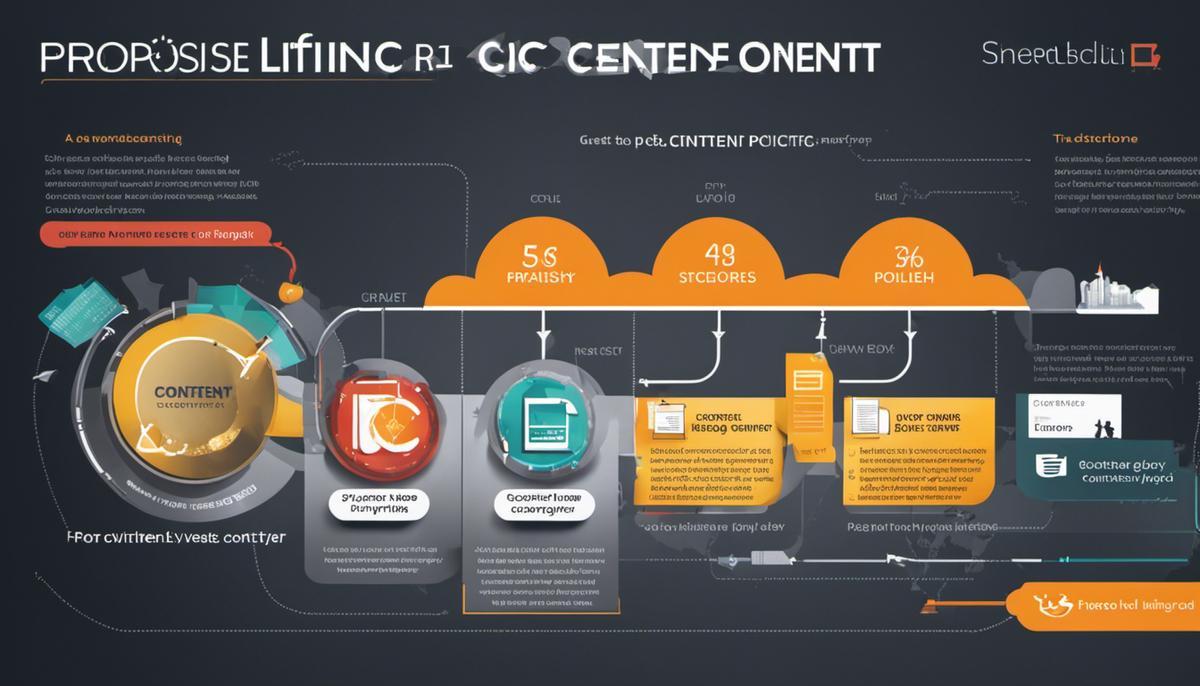In an information-saturated world, the prudent management of content is an essential process that structures the vast tumult of data into valuable knowledge. Central to realizing this formidable task is the role of an editor in the system of content management. An editor, much like an attentive gatekeeper, strives to maintain a high bar of accuracy, consistency, clarity, and fairness in information. This narrative will unveil the comprehensive definition of content management and elucidate the integral role an editor plays in this system – from the creation, management, and distribution of content to the necessary replacement of outdated information. Moreover, it will shed light on the skills and proficiency an editor must command, coupled with the ethical considerations that inform their decision-making process.
The Definition of Content Management and Editors’ Role
Functionality of Content Management Systems and the Integral Role of Editors
In the digital epoch we have embarked upon, the dissemination of information and knowledge rests substantially on the shoulders of Content Management Systems (CMS). They serve as the nucleus of most websites and web applications, considerably simplifying the processes of creation, modification, and elimination of digital content. The functionality of these systems is complex yet fascinating, with a core mechanism revolving around two crucial entities: the database and the web server.
Understanding the basic mechanics of Content Management Systems commences with the appreciation of the relationship between its core components. The database, where information is stored in an organized, easy-to-retrieve manner, integrates flawlessly with the web server that accepts requests, processes them, and sends the requested content back to the user’s device. The intricate dialogue between these two entities, orchestrated by the CMS, ensures that users receive relevant content promptly and efficiently.
Emphasis must be placed on the modularity of popular CMS platforms—like WordPress, Joomla, and Drupal— which promotes extension and scaling. Modules, often interchangeable and customizable, augment the website’s functionality, offering the potential for bespoke solutions tailored to specific needs.
However, an essential human element remains integral within the otherwise machine-dominated mechanism—the editor. Editors possess the onerous responsibility of shaping the narrative, facilitating understanding, and constructing the final product that engages with the end-user. Their role in a CMS extends beyond simple content creation, teetering towards strategic decision-making and project management.
In the context of a CMS, editors drive content strategy, establishing what kind of content needs to be developed, and how it should be structured and presented. They play a significant role in determining the site’s information architecture, carefully categorizing and tagging content to ensure optimum navigability and user-friendly accessibility. Adept at maintaining the fine balance between user experience, content relevancy, and search engine optimization, editors embody the human touch that transforms raw information into engaging, comprehensible, and valuable content.
Moreover, editors serve as gatekeepers of content quality. They scrutinize every piece of content for accuracy, coherence, format, grammar, and style. In addition to the impeccable linguistic proficiency required, an editor’s role necessitates knowledge in various realms, from understanding complex CMS functionalities to the comprehension of essential SEO principles and copyright laws.
Lastly, considering the collaborative nature of most CMS platforms, editors also often act as project managers coordinating between writers, designers, and technical staff. They are responsible for managing workflows, ensuring deadlines are met and that the overall content aligns with the objectives at hand.
In conclusion, the underlying functionality of a Content Management System is underpinned by an intricate unison of technology and human intelligence. While databases and servers, modules and customization extend the mechanical prowess of a CMS, it is the editor who breathes life into this mechanism, offering the penultimate human interface before the content reaches its final audience.

Photo by partrickl on Unsplash
The Importance of Editing in the Content Lifecycle
Why Editing is the Very Heartbeat of Content Lifecycle: An Academic Perspective
The pivotal role of an editor within the content lifecycle is often underestimated, though it represents the vital heartbeat of the content management world. Content is the lifeblood of every website, flowing through the veins of the content management system (CMS) to nourish every corner with information. Yet, the importance of the flux and refinement of this content, performed by editors, cannot be overstated.
Firstly, the editor enters the lifecycle as a meticulous assessor, examining the content with a precise and critical lens. This evaluation takes into account a number of variables, including its relevance to the target audience, its alignment with the overall content strategy, and its adherence to SEO best practices. Additionally, grammatical accuracy and stylistic consistency with the site’s tone and ethos are also taken into consideration.
Furthermore, an editor is a transformative agent in the content lifecycle. They bring value to the raw copy, enhancing readability and comprehension, optimizing it for search engines and cohering it with the website’s brand voice. The metamorphosis of raw copy into polished, valuable content is a testament to the editors’ integral role in the ecosystem of CMS.
In addition, editors play an existential role in the content lifecycle by mitigating the risk of misinformation. The stakes are high in the digital landscape, where misinformation can spread like wildfire, causing reputational and financial damages. The editor, therefore, is essentially the guardian of truth and authenticity, ensuring that every piece of content is factually accurate and ethically sound.
Moreover, an editor serves as a content optimiser, integrating SEO practices into the fabric of the content. By doing this, they help increase the visibility of the site in search engine results, amplifying the chances of discovery by potential visitors. This blend of technical skills with linguistic expertise positions editors as critical drivers in the digital promotion of a site.
Lastly, in the dynamic, rapidly evolving world of CMS’, editors continually adapt to changes in digital trends and preferences. They act as torchbearers for change, guiding the content through the shifting gears of digital evolution. This constant adaptation to alter and maintain pace with the digital world highlights the continual role editors play, not only in the content lifecycle but within the evolving lifecycle of the CMS itself.
Thus, in its totality, the role of an editor in the content lifecycle is indubitably essential. They keep both the content and the system in the prime of health, ensuring that each is optimal as they navigate the digital world together. As they guard, transform, optimize, and adapt, editors are undeniably the heartbeat of the content lifecycle, a realization that magnifies the respect we attribute to this vital link in the chain of content production, implementation, and value addition.

Skills and Proficiencies of Effective Editors
Article:
On the Scopes and Competencies of Content Editors: Essential Skills for Effective Content Management
Having established the prominent role and responsibilities of editors in a Content Management System (CMS), it becomes paramount we further unpack the skillset that enables such proficiency. A rhetorical perspective reveals that content editors are fine-tuners, risk mitigators, optimizers, and progression propellers within the CMS space.
Editors, within their scope, function as meticulous assessors of content. They employ their analytical acumen, working in a diligent manner to analyze raw copy for accuracy, relevance and quality. To fulfill this capacity, they must possess a keen eye for detail, a strong grasp of language and grammar, and an understanding of the intended audience. This process transforms vanilla and generic content into publications that are polished, valuable, and dedicated to fulfilling the organization’s aims and audience expectations.
At the heart of content editing lies the significant role of mitigating the risk of misinformation. In the current digital ecosystem, information accuracy is no longer merely preferential – it is mandatory. To circumvent the potential harm of misinformation, editors must have an authoritative knowledge of the subject matter, solid fact-checking skills, and a commitment to integrity and truth. This ensures that the content disseminated not only informs but also builds trust and credibility with the target audience.
Furthermore, the prowess of an editor goes beyond the confines of grammar and structure. An editor is also a content optimizer, tasked with intertwining Search Engine Optimization (SEO) practices within the digital content. Competence in keyword research, SEO tools, and analytics form a key part of an editor’s toolkit. This unique synthesis of editing and SEO skills propels the content to perform better on search engines, consequently driving organic traffic and enhancing online visibility.
Keeping in stride with the evolving landscape of digital trends and preferences is another non-negotiable competency for an editor. Possessing industry awareness and a solid grasp on the latest trends and innovations will ensure that the content remains relevant, engaging, and ahead of its time. Equipped with such adaptability, an editor aids in transitioning the organization’s content strategy to accommodate for new technologies, audience preferences, and market changes.
Last but not least, one must recognize an editor as the essential custodian of both the system’s and content’s health. Their expertise in the CMS platform, complemented by a clear understanding of its functionalities, leads to system optimization. Meanwhile, they levy their editorial skills towards maintaining the vigor and engaging nature of the content itself.
In essence, the complexity of the editor’s role spans beyond proofreading or correcting errors. It embodies a holistic engagement with the content that requires a unique combination of technical, knowledge-based and interpersonal skills. It is these competitors and skills that ensure the editor’s effective involvement in shaping strategies, structuring information, ensuring quality, and thereby nurturing an optimal content lifecycle under the overarching umbrella of CMS.

Ethical Considerations for Editors in Content Management
As the traitement of the aforementioned preconditions unfolds, the attention now turns towards the ethical considerations incumbent upon a content editor in the CMS environment. This arena strikes a delicate balance, where editors must navigate the labyrinth of information authenticity, intellectual property, and unbiased representation, whilst orchestrating the symphony that is content management.
Vital in maintaining ethical rigor is the unwavering respect for information authenticity and factual accuracy. In essence, editors are stewards of truth, their actions directly influencing the credibility and trustworthiness of the content they manage. As such, it becomes imperative to diligently verify the integrity of information prior to publication. This holds especially true in an era inundated with conjecture and falsity, where the propagation of misinformation is but a click away.
Coupled with affirming information authenticity is the safeguarding of intellectual property. It is incumbent upon the editor to ensure that all content published adheres to copyright laws and respects the intellectual rights of original creators. This involves vigilance in ascertaining the origins of every piece of content managed, and, when necessary, acquiring appropriate permissions or licenses.
A steadfast adherence to representing all information objectively and impartially constitutes a central tenet in ethical content management. In this sense, editors serve as the ethical compass, steering clear of bias, prejudice, or favoritism. Ensuring a diversity of views without promoting any overt agenda affirms the intellectual honesty of the CMS while fostering an environment that respects diversity and champions inclusion.
Moreover, attention to user privacy and data protection is a quintessential aspect of ethical content management. Editors should be conscious of how content, and any associated metadata, might impede upon user privacy. Adherence to data protection laws, ethical guidelines, and company policies are, in this respect, non-negotiable.
On a broader horizon, it is incumbent upon editors to uphold a sense of social responsibility. This transcends the parameters of the CMS, permeating a broader societal context. Through the ethical management of content, editors have an instrumental role in shaping a responsible digital culture, demanding an understanding of the potential impacts of the published content on the audience and society at large.
Last but not least, incorporating ethical considerations into SEO practices is a requisite in this day and age. Ethical SEO involves honesty and transparency, avoiding manipulative or deceptive practices which might “game” search engines but potentially mislead or harm users. An ethical approach to SEO not only respects users but contributes to the overall credibility and trustworthiness of the CMS.
Content management, in its dynamism and ubiquity, wields significant influence in determining the flow of information in the digital age. Thus, adopting and enforcing ethical practices in content management is not merely a guideline for editorial work but is instrumental in ensuring the integrity and reliability of the digital information sphere.

The world of content management is a dynamic orchestra, within which the editor is the conductor, ensuring the harmony of information. The editor’s role extends beyond grammatical correctness or style alignment; their purpose is grounded in the authenticity, relevance, and value of the content for its intended audience. They are champions of insightful communication – armed with superior language skills, creative intuition, and commitment to ethics. These ethical standards guide the editor through complex dilemmas, promoting respect for intellectual property rights, resisting plagiarization, and insisting on accurate data representation. Navigating through the overlapping stages of the content lifecycle, editor’s contributions actively shape the quality and impact of content in the evolving digital ecosystem.






